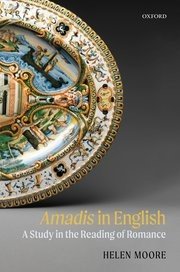Corpus is delighted to announce that Dr Helen Moore’s monograph Amadis in English: A Study in the Reading of Romance has been chosen as the recipient of the 2021 Bainton Prize for Literature by the Sixteenth Century Society & Conference.
Four Roland H. Bainton Prizes are awarded yearly for the best books written in English dealing with four categories within the time frame of 1450-1660: Art and Music History, History and Theology, Literature, and Reference Works. The criteria for selection are quality and originality of research, methodological skill, development of fresh and stimulating interpretations and literary quality.
The Roland H. Bainton Prizes are named in honour of one of the most irenic church historians of the twentieth century. Roland H. Bainton was Professor of Church History at the seminary of Yale University for many years, the advisor of many PhD students, the author of over a dozen important books, and an ardent supporter of early modern studies.
Professor Jaś Elsner, reviewing Amadis in English: A Study in the Reading of Romance for the forthcoming Pelican Record says: “Famed from the sixteenth century as the pinnacle of chivalric romance, circulating in Spanish and Latin-American versions, in French, Portuguese, Italian, German and English, Amadis has been an obsession of writers in Spanish from the early conquistadores to the likes of Mario Vargas Llosa, Gabriel García Márquez and Alejo Carpentier as well as Cervantes. But its extended history of receptions in English from the Tudor versions onwards reflects a deep Continental attraction for English letters, as well as a long history of reflections on the problems of reading. Helen Moore’s wonderful new book, now the recipient of two major prizes from the British Academy (the Rose Mary Crawshay Prize) and the Sixteenth Century Society (the Bainton Prize for Literature) details that long process of changing reception from Jacobean theatre and eighteenth-century satire via such colonialist romantics as Walter Scott and Rider Haggard to such modern voices as Paul Muldoon and Vladimir Nabokov. In homage to Don Quixote, this is a book about reading and the histories of reading – about how reading can enable both reverence and scepticism to run in tandem, about questions of translation and cultural transmission, of reading at one remove (that is, Amadis by means of its portrayal in Don Quixote), of reading as allusion-making and cultural reference, of reading as the creation of readerly community through recognition, understanding and affect. It commands its subject in depth and with affection, throwing a long light onto the Medieval fantasy that flickers continually in English literature."
